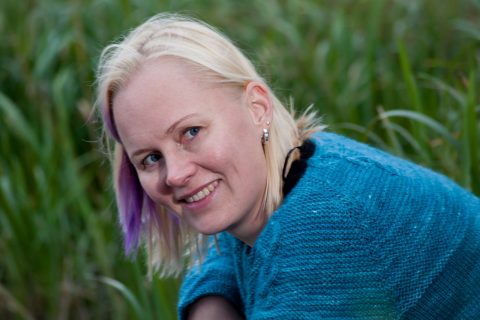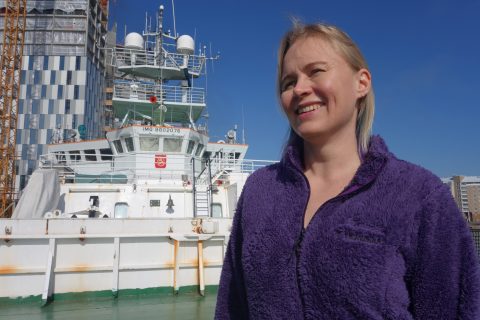Dr. Laura Uusitalo works as a Head of Unit and Senior Research Scientist at the Finnish Environment Institute. She’s interested in marine food webs and modern intelligent data analysis methods.

Dr. Laura Uusitalo. Photo: Jari Juslin
What did inspire you to pursue a career in marine sciences/technologies?
When I was a teenager, I wanted, for a while, to be a sociologist. Later, I got increasingly interested in natural sciences, and chose to study limnology at the university because of its wide scope that includes everything from hydrology and water physics through chemistry and ecology to the societal aspects of the use of natural waters. I found that diversity highly inspiring, and have never regretted my choice of career.
What are the main things you enjoy about being a marine scientist/engineer?
There are so many things I enjoy in my job: getting to do science; the diversity of the field from bleeding-edge ecology to societal questions; getting to work with brilliant colleagues both in my institute and internationally; getting a high degree of freedom to define my own work; and knowing that I’m doing my share for the protection of the seas.
What are your recent professional achievements?
In 2016 a consortium I’m leading obtained funding for three-year research project BONUS BLUEWEBS. In this project we’re looking at the Baltic Sea food webs and how they change, and how to manage the environment and human activities for both the ecosystem’s and human societies’ benefit. I am thrilled for this opportunity to do this scientific work, as well as the opportunity to lead this wonderful consortium. It also gives me a new viewpoint to science policy and research communication, which is highly interesting.

Dr. Laura Uusitalo. Photo: Thierry Winn
Have you ever had any difficulties in your career due to your gender? If yes, how did you handle them?
I have not had any difficulties that could be clearly and objectively pinpointed to gender. However, I have observed that in some cases, male colleagues are evaluated more favorably and females more critically. Women may also sometimes need to make an extra effort to get their voices heard, and they have to be much more careful in their wording and tone in order not to be perceived negatively. This can be very tiresome sometimes.
Do you think there is a need for special girls’ support to study marine sciences/technologies?
I think there is a general need to get rid of gender roles in the society, and let everyone choose a career and lifestyle that fits them the best. One of the steps to get there includes encouraging people to make career choices that are not typical for their gender; this might include supporting women to choose marine sciences. However my impression is that in Finland, the students of marine science represent all genders in a rather balanced way. Technological sciences are still quite male-dominated, and encouraging girls in these fields is a task school and university teachers need to take seriously.
How could they be encouraged to pursue careers in marine sciences and technology?
I have heard that research shows that having female scientists as role models is a good way to encourage girls into natural sciences. In addition, teachers should be very careful to give fair and equal chances to all students regardless of their gender.
Do you think there is a need for special support to retain women in science?
There is research that shows that women “drop out” of science more than men particularly at the post-doc stage, so it would be important to see what causes this and how it can be avoided. There are probably several reasons, including the possibilities to get funding to continue the work, attitudes of colleagues and the scientific community in general, and the fact that post-doc stage is also often the age to have children, and combining career and family can be difficult.
How can we overcome the issues driving women out of careers in marine science and technology?
Some measures that are likely to help would be to improve the gender sensitivity of recruitment and evaluation processes (to avoid the deeply ingrained, cultural, largely subconscious bias against women), improving the possibilities to combine work and family (including good child-care services, family leaves, the ease of returning back to work from family leave) and supporting a culture that allows both parents of a family to work (affordable and high-quality child-care, tax and benefits policies, etc.).
What advice would you give any women considering science as a career path?
Go for it – science is wonderful! Remember that you don’t need to please anyone – it is enough to do good work. And keep your work-life balance in check, don’t work all nights and weekends, as it is not good for your well-being, but it is also not good for your creativity – you will need to let your brains refresh and recharge in order to get good ideas and work efficiently.
What are the most effective way for you to maintain balance of your professional and personal life?
I have never worked much above the regular working hours. Sometimes I have found it difficult, but it has been worth it also to show myself that what I can do in 40 hours a week is enough.
I enjoy dancing (I’ve done tap, Irish, ballet, oriental, tribal fusion, folk and swing dances among others); for me it is a great way to detach myself from work and focus exclusively on something that is both physical and mental, intellectual and intuitive at the same time.
My children also make it necessary to leave the office early; sometimes when flow strikes me, it would also feel good to stay in the office and just work until the night. J
What are your professional and personal dreams?
I just love to do research and would love to get the opportunity to continue that. I would like to do research that makes a difference in how we understand and manage the seas. I would also like to be able to help and inspire young scientists in finding the best in themselves and reach their dreams.